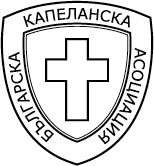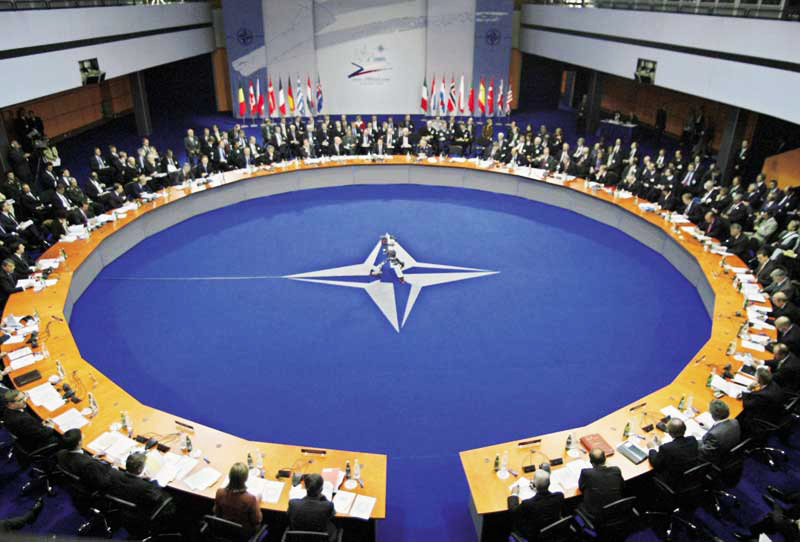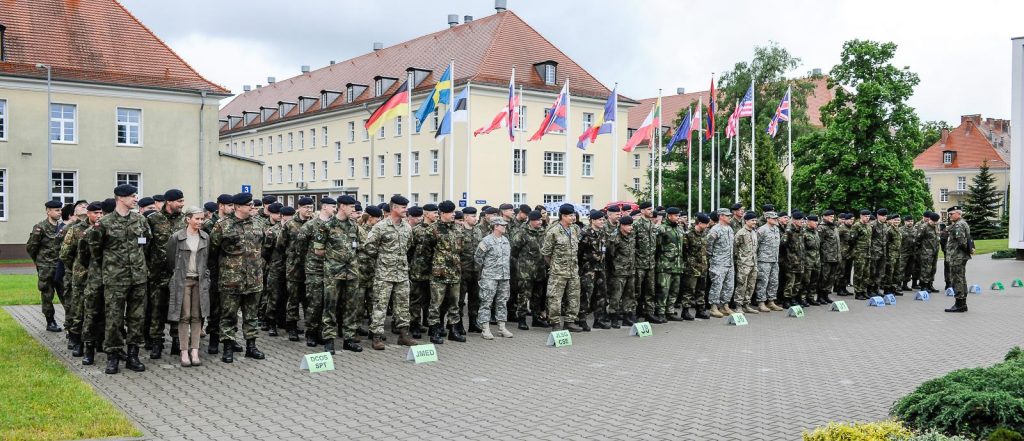Our Bulgarian Chaplaincy Association celebrates 25 years of Military Ministry in Bulgaria
 Our Bulgarian Chaplaincy Association celebrates 25 years of Military Ministry in Bulgaria since the first event co-hosted by the Bulgarian Armed Forces and government officials in 1997.
Our Bulgarian Chaplaincy Association celebrates 25 years of Military Ministry in Bulgaria since the first event co-hosted by the Bulgarian Armed Forces and government officials in 1997.
2018 The Road toward a Balkan Multi-Ministry Center and Legal Status
2017 Bulgarian Chaplaincy Association: Legal Case Renewed
2015 Revisting the Integration Proposal with Local NATO Programs by Bulgarian Chaplaincy Association
2014 Bulgarian Chaplaincy Association: Vision and Resolution Reaffirmed
2012 First Class of the Master’s of Chaplaincy Ministry Program
2011 Master’s of Chaplaincy Ministry Program Continues
2010 Master’s of Chaplaincy Ministry Program begins in Sofia, Bulgaria
2009 Bulgarian Chaplaincy Association holds an introductory chaplaincy course in Yambol, Bulgaria
2008 The Case of a NATO Chaplaincy Model within the Bulgarian Army released
2007 Bulgarian Chaplaincy Associations Recognized by U.S. Department of State
2006 Registration for the Bulgarian Chaplaincy Association Rejected by Bulgarian Court
2005 The Bulgarian Chaplaincy Association presented before the Bulgarian Evangelical Alliance
2004 Three U.S. Bases in Bulgaria to be Built by 2010
2003 The Case of a NATO Chaplaincy Model within the Bulgarian Army
2002 First Balkan Chaplaincy Conference at the Central Church of God in Sofia, Bulgaria
2001 Church of God Chaplaincy Commission to visit Bulgaria
2000 Euro-seminar: Christian ethics in the military forces
1997 First Military Ministry Seminar in Veliko Tarnovo
With all this accomplished, in the beginning of the 21st century law and chaplaincy meet on the road to democracy as Bulgaria remains the only country in NATO without military force chaplaincy. But before chaplaincy could be legalized completely and endorsed by the state to its full functionality, several changes must be undergone. Some of them are:
- Legal provision allowing chaplains to work as staff in the army, which guarantees the equal presence of protestant chaplains as well.
- The approval, acceptance and implementation of a NATO based model for chaplaincy within the structures of the Bulgarian Army.
- Periodical and systematic educational strategy toward chaplaincy workers among Bulgarian evangelicals.
- A paradigm for cooperation of Bulgarian chaplains from various ethnic, religious and cultural backgrounds.
- Further research publications to enhance the efficiency of chaplaincy within the Bulgarian national context.
Also important [click to read]:
- U.S. Department of State recognizes our chaplaincy efforts in Bulgaria
- Bulgarian Chaplaincy Association: Integration Proposal with Local NATO Programs
- Bulgarian Chaplaincy Association: Vision and Resolution
- Chronology of our role and involvement in developing Church of God chaplaincy in Bulgaria since 2001
- Master’s of Chaplaincy Ministry Program in Bulgaria Reflections
- The Past Decade of Chaplaincy in Bulgaria (2006-2016)
- Related Publications and Presentations by Cup & Cross Ministries International
More Publications on the Topic and History of Events:
- Chaplaincy Conference and Master’s of Chaplaincy
- Chaplaincy Course in Yambol, BULGARIA
- Bulgarian Chaplaincy Association Annual Meeting
- Family Seminar for Military Men and Women
- Cup & Cross Ministries in Church of God Publications
- The Case of a NATO Chaplaincy Model within the Bulgarian Army
- 10 Years of Military Ministry in Bulgaria
- National Chaplaincy Conference
- Bulgarian Chaplaincy Association Gains Legal Status
- Chaplain Dees Visits Bulgaria
- Chaplaincy Course at the Bulgarian Evangelical Theological Institute
- Bulgarian Chaplaincy Association
- Meeting the NATO Chaplain
- National Chaplaincy Meeting
- Chaplaincy Developments in Bulgaria
- U.S. Bases in Bulgaria
- National Chaplaincy Meeting
- Chaplaincy in Bulgaria
- HEALTHCARE CHAPLAINCY IN BULGARIA
- Chaplaincy in Bulgaria
- Mission Bulgaria
Bulgaria Hosts Multinational Military Exercises in 2021
Sofia, April 25 – Bulgaria will host and share in a series of multinational military exercises in 2021 so as to enhance its armed forces’ operational capabilities, the Bulgarian Defence Ministry said in a press release on Monday.
Between March and mid-June, over 30,000 troops of 26 NATO Member States will hone interoperability in simultaneous defense operations at 30 training areas in 14 countries during a series of interconnected exercises codenamed DEFENDER-Europe 21, which will be led by the U.S. Army Europe and Africa.
DEFENDER-Europe 21 is associated with a key training event: NATO’s Steadfast Defender 21 (mid-May through early-June), led by the Supreme Headquarters Allied Powers Europe (SHAPE), in which Bulgaria will mainly contribute logistical support as a host country for forces transit.
DEFENDER-Europe 21 will encompass several linked exercises, including Swift Response, Saber Guardian, Immediate Response, and Defender Europe.
From mid-May to mid-June, Bulgaria, alongside Germany, Romania, Hungary, the Republic of North Macedonia and Albania, will host Exercise Saber Guardian, in which more than 13,000 service members from 16 countries will conduct live fire and air and missile defense operations, plus a large scale medical evacuation. In Bulgaria, Saber Guardian will encompass three national exercises with international participation: Strike Back
21, Balkan Sentinel 21 and Shabla 21, and a special operations exercise called Trojan Footprint – South. Bulgarian military elements will participate in Exercise Decisive Strike in the Republic of North Macedonia, which, too, is part of Saber Guardian.
Swift Response (early to mid-May) will include airborne operations in Estonia, Bulgaria and Romania involving more than 7,000 troops from 11 countries.
In Exercise Immediate Response (mid-May through early-June), more than 5,000 troops from 11 countries will spread out across 31 training areas in 13 different countries to conduct live fire training.
In June, approximately 1,500 personnel will stage Defender Europe, a command post exercise seeking to drill the
headquarters’ ability to command multinational land forces in a joint and combined training environment while maintaining real-world operations across 104 countries, including Bulgaria, on two continents.
Historical Overview of Military, Hospital and Occupational Chaplaincy in Bulgaria

 We are proud to announce that the Master’s of Chaplaincy Ministry Program, we designed and launched in Bulgaria in 2006, has been selected to be part of the Social Service Program of New Bulgarian University. After being for years a valuable part of the regular curriculum of the Bulgarian Evangelical Theological Institute and the St. Trivelius Institute in the capital Sofia, the chaplaincy program has received the highest level of recognition as successful graduates will be finally able to receive government recognized degrees and apply their knowledge and training in chaplaincy on a professional level. The chaplaincy program can also serve within the Integration Proposal of local NATO programs and be instrumental in dealing with the enormous wave of Middle East migrants crossing through Bulgaria today.
We are proud to announce that the Master’s of Chaplaincy Ministry Program, we designed and launched in Bulgaria in 2006, has been selected to be part of the Social Service Program of New Bulgarian University. After being for years a valuable part of the regular curriculum of the Bulgarian Evangelical Theological Institute and the St. Trivelius Institute in the capital Sofia, the chaplaincy program has received the highest level of recognition as successful graduates will be finally able to receive government recognized degrees and apply their knowledge and training in chaplaincy on a professional level. The chaplaincy program can also serve within the Integration Proposal of local NATO programs and be instrumental in dealing with the enormous wave of Middle East migrants crossing through Bulgaria today.
The Country of Bulgaria in World History
The dramatic split of the Roman Empire preceded the establishment of the first Bulgarian Kingdom on the Balkan Peninsula in 681 AD. The consecutive military, cultural and economical influence of Byzantium over the Bulgarian nation claimed the newly established country to the side of the East from its birth. This propensity was sustained through the two Bulgarian Kingdoms (established respectfully in 681 AD and 1188 AD). It was renewed with even greater strength when the Ottoman Empire overtook the weakened country of Bulgaria in 1139 AD and for the next five centuries, the Orient claimed control of European Bulgaria.
In 1878, Bulgaria was liberated from the Ottoman Yoke by Russia, but only to remain under its political and economical umbrella for the next 111 years until the fall of the Berlin Wall in 1989. This event reaffirmed Bulgaria’s belongingness to the East as the country joined the Central Powers throughout World War I and deliberately remained with the Axis Powers in World War II.
Even when, on September 9, 1944, the Bulgarian Communist Revolution overthrew the monarchy and forced the country to move to the opposite camp of the war, Bulgaria’s allegiance remained with the Eastern of the Allies – the Soviet Union. This belongingness continued during the next 45 years to reform Bulgaria’s economical, political and cultural reality while transforming the Bulgarian mindset to a mentality which today remains the primary obstacle to Bulgaria’s integration in the free world.
As the country of Bulgaria is now a member of NATO and awaits acceptance into the European Union in 2007, international experts are working with various government institutions and consultant agencies to create an atmosphere in which the Bulgarian mindset can experience a new national revival in the 21st century. NATO’s involvement in this process serves as a catalyst both for reinforcing Bulgaria’s infrastructure and attracting international interest in the country’s affairs. Issues concerning national security, military involvement, international relations, economical development and ethnic diversity are continuously and carefully taken into consideration. However, one issue still remains untouched neither by NATO’s official position in Bulgaria, nor by the Bulgarian government. This is the issue of faith.
Also important [click to read]:
- U.S. Department of State recognizes our chaplaincy efforts in Bulgaria
- Bulgarian Chaplaincy Association: Integration Proposal with Local NATO Programs
- Bulgarian Chaplaincy Association: Vision and Resolution
- Chronology of our role and involvement in developing Church of God chaplaincy in Bulgaria since 2001
- Master’s of Chaplaincy Ministry Program in Bulgaria Reflections
- The Past Decade of Chaplaincy in Bulgaria (2006-2016)
- Related Publications and Presentations by Cup & Cross Ministries International
Brief Historical Overview of Chaplaincy in Bulgaria
It is true that clear documentation for the presence of chaplaincy in Bulgaria may be difficult to produce, especially according to any modern definition of chaplaincy ministry. However, it would not be unfounded to claim that the practice of military priests acting as chaplains in the Bulgarian Army dates back to at least Bulgaria’s national conversion to Christianity under King Boris I in 863AD. Having adopted virtually all the characteristics of a religious state from Byzantium, Bulgaria utilized priests and liturgy in its military forces.
During the time of the Ottoman Empire, the tradition of military priests ceased, as naturally Bulgaria had no army. However, foreign representatives continuously carried the ministry of chaplaincy through the Bulgarian lands. Around the 14th century, immigrants from Dubrovnik found a diaspora in Sofia. In 1486, they built the Patrum S. Franscisci Cathedral. The assigned priest also ministered as a community chaplain.[1] In the 16th century, German theologian Stephen Gerlah traveled through Bulgaria as a secretary to the protestant ambassador to Constantinople. Gerlah reports of the religious intolerance toward the Bulgarian population.[2]
Every military force dispatched to Bulgaria arrived with a chaplain. For example, British chaplains were active during the Crimean War.[3] In 1860, Principle Chaplain to the forces of the East, H.P. Wright reported an outburst of cholera in the General Hospital at the Black Sea port of Varna.[4]
After the liberation from the Ottoman Yoke in 1878, the Missionary Herald reports: “The Protestant preacher from Adrianople is just in. …. The governor of Southern Bulgaria, who resides there, is a Russian general, and is a strong Protestant.[5] He has Protestant services (conducted by his chaplain) every Sabbath, at the government house.”[6]
In 1879, the German prince Alexander Battenberg was enthroned in Bulgaria. The new monarch arrived with a personal chaplain, a Lutheran minister by the name of Adolf Koch.[7] Koch was instrumental in organizing a commune of German immigrants and holding regular protestant services in a specially designed building. The royal entourage, German families, Austrian and Swiss merchants and bankers and Russian officers, attended these services.[8]
At approximately the same time, Bulgarian Orthodox priest resumed their position with the armed forces in various conflicts. Orthodox priests actively participated in the Russian-Turkish (1877-1878) and the Serbo-Bulgarian (1885) wars. It was during this period that the Bulgarian chaplaincy tradition was reestablished under the title “garrison priest” and Vladimir Solovyov first discussed the theology of war. The role of the Bulgarian Orthodox Church continues to be present during combat throughout the Balkan Wars (1912-1913), often called the “Orthodox Holy War” and “The Last Crusade.” Orthodox chaplaincy is also present in the two World Wars, but the orthodox theology of war viewing Bulgaria as the “New Israel” was completely destroyed when Communism overthrew the monarchy establishing a new regime.[9] Religion was rejected as “opium of the masses” and the military chaplain for the next 45 years was replaced by the regiment’s politcommissar.
[1] Kratak Istoriheski Pregled. http://www.bukvite.com/studio/teoria.php?lid=48 (August 1, 2006).
[2] Stephen Gerlah, Dnevnik na edno patuvane do Osmanskata porta v Carigrad (Sofia: Izdtelstvo OF, 1976).
[3] Frances Duberly. Journal kept during the Russian War. (London: Longman, Brown, Green, and Longmans, 1855). Also, William W. Hall, Purtans on the Balkans (Sofia: n/a, 1938), 49, 61 and 249.
[4] “Realities of Paris Life”. The Dublin University Magazine: A Literary and Political Journal. Vol. LV (January-June, 1860), 166.
[5] Perhaps reference of general Arcadii Stolipin, who served as the governor of Eastern Rumelia after Bulgaria was divided by the San Stefano Treaty of 1878.
[6] “European Turkey Masson.” The Missionary Herald, Containing the Proceedings of the American Board. (July, 1878:74, 7).
[7] Report Girl’s School, 1881. Archive: American Board of Commissioners for Foreign Missions, Vol. I, 146. Annual Report, American Board of Commissioners for Foreign Missions, 1882, 26.
[8] H. Mayer, Die Diaspora der Deutshen Evangeliscen Kirche in Rumanien, Serbien und Bulgarien (Postdam, 1901), 440.
[9] Svetlozar Eldarov, Pravoslavieto na Voina (Sofia: Sv. Georgi Pobedenosec, 2004).
10 Years of Military Ministry in Bulgaria
 Military Ministry in Bulgaria is celebrating 10 years. The special events will be held in the Black Sea town of Varna, Bulgaria. Chaplains from around the country, as well as international colleagues and friends, are invited for a time of reunion and inspiration. Special speakers of the event are Paul Pettyjohn and Chaplain Bernie Windmiller from the International Association of Evangelical Chaplains.
Military Ministry in Bulgaria is celebrating 10 years. The special events will be held in the Black Sea town of Varna, Bulgaria. Chaplains from around the country, as well as international colleagues and friends, are invited for a time of reunion and inspiration. Special speakers of the event are Paul Pettyjohn and Chaplain Bernie Windmiller from the International Association of Evangelical Chaplains.
After serving the military in Bulgaria for a decade, the ministry is strategizing the legalization of chaplaincy and pastoral care in the Bulgarian professional army and police. Today, this difficult task seems closer than ever before, as ministers, pastors and caregivers are excited about the opening of such doors and the new opportunities which it will present for Bulgaria.
NATO Top General “Pleased” with Bulgarian Military Bases
 NATO’s Supreme Allied Commander Europe (SACEUR) and commander of American troops in Europe General James Jones has been impressed by the qualities of the Bulgarian bases and infrastructure offered to the US troops, reads a letter, addressed to the Bulgarian Chief of Army Staff General Nikola Kolev.
NATO’s Supreme Allied Commander Europe (SACEUR) and commander of American troops in Europe General James Jones has been impressed by the qualities of the Bulgarian bases and infrastructure offered to the US troops, reads a letter, addressed to the Bulgarian Chief of Army Staff General Nikola Kolev.
General Jones also says he is ready to present and to uphold the US’ use of the bases before the competent authorities in Washington, the Bulgarian Defense Ministry press center informed Tuesday. On Friday the Defense Minister Nikolay Svinarov has announced that the US troops are to deploy to three new bases in Bulgaria. Negotiations are nearing the finish line and are expected to be wrapped up in March, Minister Svinarov has said.
Last month NATO’s General James Jones made a trip to Bulgaria and Romania, where the US were to choose from four of five locations for the prospective military sites in each country. The facilities are to be used by Army, Air Force, Navy or Marine units.








